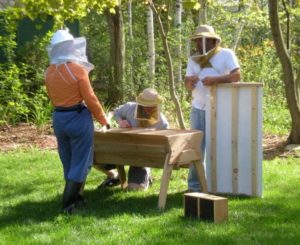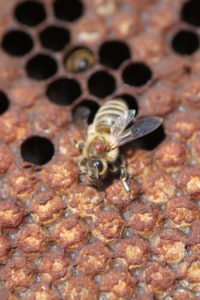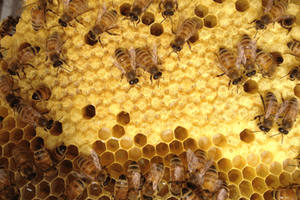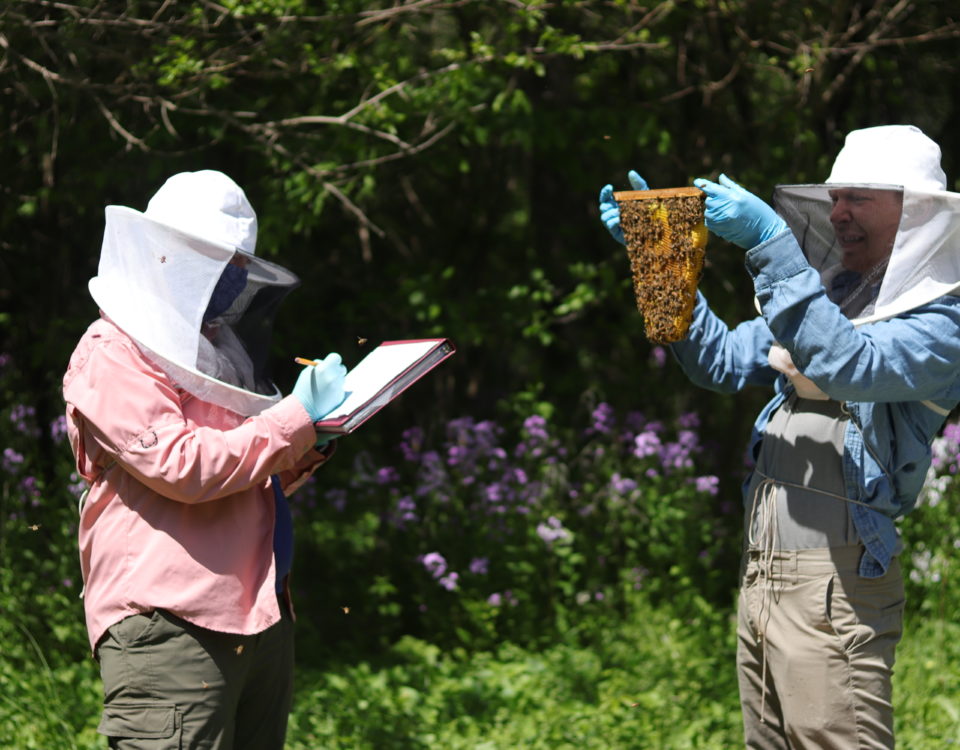- All-In-One Beekeeping for the Bees
- +1-608-728-8233
- info@beepods.com
Seasonal BEEhavior Changes
If you have been keeping up with our “Honey Do List” Newsletter, you may have noticed that we mentioned bees tend to get ornerier around July and August. Why is that? Because of the heat.
Have you ever considered how the behavior patterns of bees change within each season? How they react to hot/cold, windy/sunny, snowy/rainy? We are about to walk you through some seasonal temperature changes and how that affects bee behavior. Let’s start with behavior you can observe right now.
Summer
As we all know by now, honey bees are crucial for the survival of our ecosystem and the summer time can be a very busy time for these bees. They work from dawn to dusk to ensure that they have enough food, and they will continue to work this hard as long as it is warm enough and not raining. Rain can affect how much or little bees forage for the day and rain is very prevalent during the early summer time.
 Bees can sense changes in humidity, temperature and barometric pressure. Bees will monitor the weather and stop foraging when it is raining, which is interesting since bees are a hoarding species, and their foraging ecology is not based on immediate need.
Bees can sense changes in humidity, temperature and barometric pressure. Bees will monitor the weather and stop foraging when it is raining, which is interesting since bees are a hoarding species, and their foraging ecology is not based on immediate need.
Rain is not the only thing that keeps bees from foraging. Bees and beehives can get overheated, too, and the excessive humidity and hot weather can change the behavior of the entire colony. In general, they start to get annoyed and defensive. Beehives need to be kept at 95 degrees Fahrenheit in order to produce honey correctly. If the hive becomes hotter than that, the bees will station themselves inside their hive and fan their wings to stay cool and provide ventilation throughout the hive. (Think of this as if you had one job shift to complete and then were called in to work a double shift instead, you would get pretty annoyed right?)
With this extreme hot weather, there will be an increase in water foraging too. In an article from Scientific Reports, they found a 70% increase in water foraging because of the heat but there was no sign of increasing pollen or nectar foraging. The reasoning for this is because the summer time, despite the heat, can be one of the hardest times for bees to forage.
Bees often deal with exploitative competition for shared floral resources, which can alter their foraging behavior and flower choice tremendously. We do see a higher competition rate between bees during the summer over other seasons, but that does not mean they are working harder to forage than they would in other seasons.
Fall

A lot of the work bees do in the summer is in preparation for the fall season. In the fall, the weather is not extremely hot anymore and winter is right around the corner. So what does this mean for bees?
While summer is coming to an end and fall is blooming, worker bees have long strenuous hours ahead of them. They need to collect enough nectar to feed and maintain their colony throughout the cold winter months. Bees know when it is time to go into food-gathering mode because the days get shorter. If they do not make proper preparations, their colonies may not survive the winter.
With the stress of keeping their colony and queen alive, it is likely that these bees become stressed and agitated. As the winter season creeps closer, this stress on the colony increases causing many flowers and insects to deplete by very cold temperatures. The worker bees that are preparing for winter are also going to be the ones who get the hive going again during the Springtime.
As you can see, bees can get agitated and stressed out by seasonal changes and weather shifts. At Beepods, we have tips on how to keep them more comfortable and prepared for changes in season and temperature. You can get monthly beekeeping tips right in your inbox when you subscribe to our “Honey Do List” newsletter.
Extra Information:
About: Seasonal variation in exploitative competition between honeybees and bumblebees
https://link.springer.com/article/10.1007/s00442-019-04576-w
About: Colony adaptive response to simulated heat waves and consequences at the individual level in honeybees
https://www.nature.com/articles/s41598-017-03944-x
About: Honeybees know it’s going to rain, so work more before it starts
About: Why are bees and wasps so busy in autumn?
https://phys.org/news/2012-10-bees-wasps-busy-autumn.html
Elizabeth Allon
Latest posts by Elizabeth Allon (see all)
- Short But Mighty: The Stages of Life - January 26, 2022
- Honey Bees Vs. Highways - January 19, 2022
- 4 Ways to Save The Bees in 2022 - January 12, 2022



